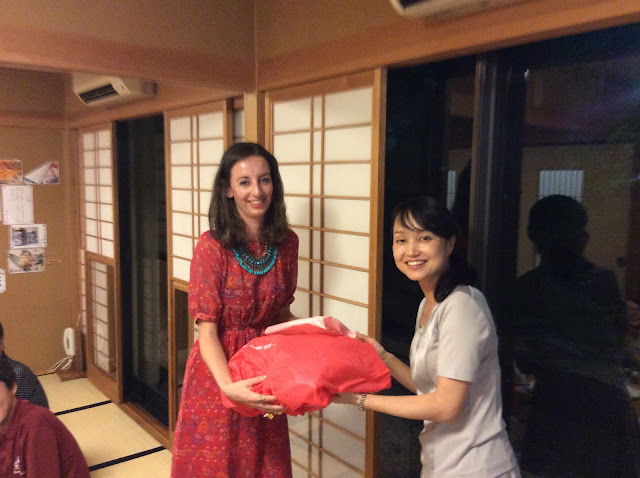It’s now more than four months since I moved across the world for a
second time and made another home in the Pacific Northwest, and I wanted to
note down some observations before I get so used to life here that they seem
commonplace.
Firstly, to all kind readers aren’t sure what the heck I’m doing over
here: I moved to Eugene, Oregon to do a Master’s in Nonprofit Management at the
University of Oregon, a program that isn’t really available in the UK but is
becoming increasingly common over here. At the same time, I work 20 hours a
week as a GTF (Graduate Teaching Fellow) coordinating the International
Cultural Service Program, in return for tuition, healthcare and a stipend. It’s
a tuition scholarship for international students – they make presentations and
teach classes to community groups about their culture; I manage their
appointments and teach them how to do
it. They’re a wonderful group of students from Tibet to Turkmenistan, with some
incredible stories of how they came to be here. Their challenges as
international students are humbling and put mine in perspective.
Apart from that, I’m currently interning at a Foundation that raises
money for the local community college; chairing the Events committee and acting
as Secretary for the UO’s chapter of Association of Fundraising Professionals;
and practicing with the UO taiko group every week.
Last term was a full and extremely busy to the start of my two years
here. This term I’ve resolved to make the most of my measly 9-credit load and
take at least one day off from homework a week, read and exercise more, and
keep exploring this beautiful part of the world. Eugene and the UO are just
about as opposite from St Andrews as you can imagine, and I’m loving getting to
enjoy that contrast.
St Andrews was a tiny stone fishing town replete with a ruined cathedral
and the oldest golf course in the world, where the ‘gown’ student population of
rich Americans and Scandinavians and ‘town’ population of Scottish locals were
pretty much separate. Heeled boots and a statement necklace were standard wear
for the library. Undergrads were heavily involved in extra-curriculars from the
Vanity Fair and Vogue-covered annual fashion show to the rugby and hockey teams
to the half dozen student publications detailing small-town exploits. For fun
there was a black-tie event at least every month, or a couple of clubs the size
of living rooms where wealthy, drunk golfers would occasionally feel generous
and buy us a round, or you could always just pop into a stranger’s house party
glimpsed from the street: you inevitably would know someone there. An unlocked
bike could survive weeks, and each year was punctuated by traditions dating
back 600 years.
Eugene has long been a hub of West Coast counter-culture, nestled in a
valley between pine-covered mountains and surrounded by rivers and hot springs,
the wide cracked streets lined with old trees and individuated wooden houses
with porches. The student
population at first sight appears to be a mix of green-and-yellow clad Ducks
fans (the football team here is huge); sorority girls and frat boys; Asian students hanging out in designer clothes and driving round in white Bentleys; hippie
kids in tie dye and dreads, and the ubiquitous student in North face and hiking
boots on a sweet bike. The locals are very engaged in town life and there is a
lot of activism: people really care. Locked bikes go missing after an hour and
there is also quite a large homeless population. And yet Eugene has its own
distinct character. Downtown is peppered with yoga studios, sushi bars,
cannabis shops, craft and second-hand bookstores, coffee spots and
microbreweries.
I’m also finding university culture very different, although some of
that is probably down to being in graduate school this time around, as well as
taking a more professional than academic degree. Assignments tend to be smaller
and more frequent and classes include a participation grade, whereas in
Scotland you could basically turn up or not, and hand in one big essay at the
end of term. Equity and inclusion is also emphasised far more, making the
annual male-only Kate Kennedy parade of my undergrad years seem terribly
outdated. The campus is huge and the facilities, especially the monolithic
sports centre, reflect the $32,000/year fees for non-residents.
I love the Oregonian philosophy of life too. It’s a liberal, outdoorsy,
unpretentious (despite the Portlandia depiction of insufferable hipsters) and
relaxed state. People seem to understand how to have a good quality of life
with time to be outside, have hobbies and talk to strangers. They’re friendly
in a way that feels authentic (classic Oregonian buzzword).
That said, there are a few differences I’m still getting used to. It’s a
cliché that Brits are polite and reserved, but it’s a cliché for a reason.
Saying sorry, please and thank you all the time is normal for me, and I
sometimes have to remind myself that the conversational differences don’t
indicate rudeness but simply a different normal. Likewise with other subtle
quirks: phrases like ‘I don’t care’ instead of ‘I don’t mind’ or calling
someone ‘she’ instead of their name. People feel far more open about sharing
their lives with work colleagues and acquaintances, and are way more blunt, but
it does make for interesting conversations. I do miss dry British humour and
sarcasm and am often taken literally when I’m being anything but serious.
One of the other two main things I’ve noticed, or more accurately just
felt, is the work ethic. It seems like people here work longer hours and take
fewer holidays, but also have their identity more intertwined with their jobs
and career. Work isn't so much just something you do between 9-5 and
is more integral to people’s character. The other is the sense of social
security. Even speaking as a privileged grad student with great health
insurance, it seems like it’s far easier to slip through the cracks here: have
a run of bad luck and make a few mistakes and you could be down and out far
more easily. I’ve come to appreciate the NHS more than ever as an incredible
safety net that we take for granted too often. The relationship to the state
here is also something I had to see first hand to really understand. Rather
than an embedded expectation of or dependence on the state, here there is an
element of deep-seated suspicion – one reason for the many nonprofits.
That’s not to say these differences are bad and one way is better than
the other! I feel privileged to be living in a foreign country again, this time
one where I can speak the same language and thus connect with people in a
different way, and to have the time to try and understand a different way of
life. I’m realising what a big step my American friends took in moving to St
Andrews at 18, and understanding them in new ways, too.
Apart from that, I miss bathroom cubicles that don't have 1-inch gaps
all around the door, British white bread, butter and cream (food also tends to
last twice as long here, I think due to what chemicals are in it), the BBC, eclectic
fashion sense, public transport, and being left well alone by people in shops.
But on the flip side, I love the cheap movie tickets, un-measured alcohol units
in bars, absence of biting North winds, egalitarian ethos, and the
open-heartedness of the people here.I don't know if one day these notes will feel like distant memory, or the start of what was to become everyday, and I'm ok with that for now.






























































